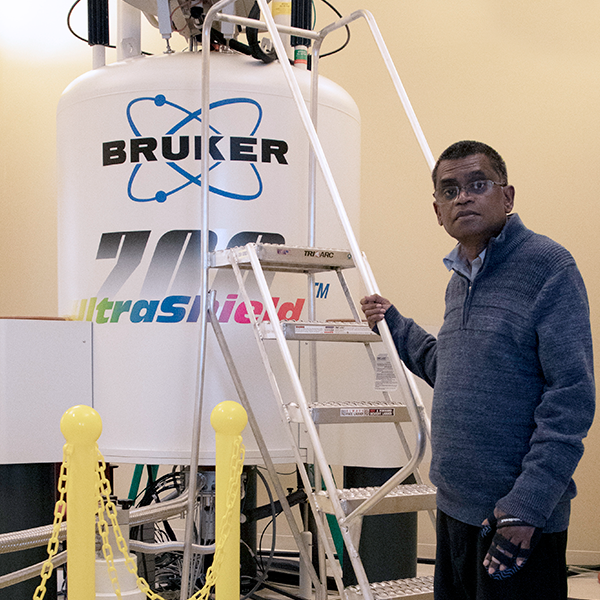Metabotyping for Better Health
For 12 years, Wimal Pathmasiri, PhD, has been conducting metabolomics research to understand the links between exposures, microbial metabolism, and human health. His specific field of study is biomarker identification by metabolic phenotyping (metabotyping). Metabotyping allows analyzing small molecular weight molecules in biological samples (e.g., blood, urine, tissue samples) using state-of-the-art analytical technologies such as hyphenated mass spectrometry or NMR spectroscopy methods.
“I was always interested in identifying biomarkers that help understand the mechanisms underlying disease, effects of exposure, or response to treatment,” Pathmasiri says. Metabotyping studies enable understanding of the mechanisms underlying disease conditions, exposure status, or the response to treatment by identifying perturbed metabolic pathways. Since we know that there is no one fit for all treatment options as interventional strategies due to the heterogeneity in various conditions in diverse populations (e.g., genetic polymorphism, differences in the microbiome), it is better to identify targets and to apply nutritional intervention strategies for precision health.
Pathmasiri has circled the globe to pursue his research interests. He started his career as a research assistant in organic synthesis in the Department of Chemistry at the University of Colombo, Sri Lanka, where he earned his bachelor’s and master’s degrees. After a stint as an engineering teaching assistant, he moved to Sweden to study pharmacognosy (studying drugs of natural origin) and bioorganic chemistry, earning a Licentiate in Pharmacy and PhD in Chemistry from Uppsala University. He next joined the Department of Biochemistry at the University of North Carolina at Chapel Hill as a postdoctoral fellow to study the structure and dynamics of nucleic acids. There he was introduced to the field of metabolomics, joining the UNC Metabolomics Laboratory, from which he moved to the research group of Susan Sumner, PhD, at RTI International, a nonprofit research institute. Working with the Sumner group, Pathmasiri was instrumental in proposal development, helping to win the NIH Eastern Regional Comprehensive Metabolomics Research Core, and became a technological leader for ERCMRC. When the Sumner group moved the ERCMRC to the Nutrition Research Institute in 2017, Pathmasiri came back to Carolina as an assistant professor in the Department of Nutrition.
While it seems Pathmasiri moved smoothly and with purpose through this impressive career trajectory, he emphasizes that he has had great mentors who helped guide him. In particular, he singles out his time working with Sumner. “Dr. Susan Sumner has guided me throughout my career to achieve my goal of becoming a leader in metabolomics research. She provided me with resources, training, guidance, and opportunities for professional development including outreach.”
Metabotyping in nutrition research is used to understand the ways in which nutrients from food are involved in health and how we can identify specific nutritional needs as interventional targets for the disease. It can be used to study differential responses to dietary intervention studies, and personalized nutrition and to assess dietary intake and dietary patterns. Understanding health or exposure conditions through metabotyping will help us design nutritional interventions that inform the ways people live, eat, or receive health care.
“My goal is to understand the links between exposures, microbial metabolism, and human health,” says Pathmasiri. “I am involved in developing and applying metabolomics to reveal metabolic pathway perturbations associated with disease states, therapeutic treatments, and environmentally relevant exposures.” Through this work, Pathmasiri is playing a key role in advancing personalized or precision nutrition, at the heart of the NRI’s mission.

